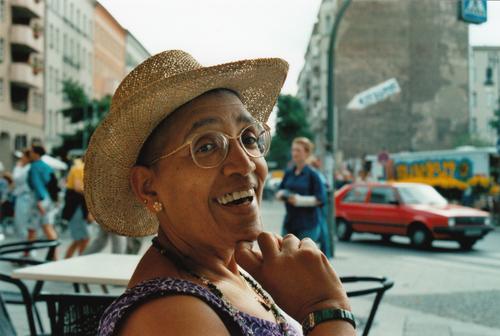Exhibition: Audre Lorde – The Berlin Years
In einem Café am Winterfeldtmarkt, 1992 / Freie Universität Berlin, Universitätsarchiv, NL Lorde, Sig. 176
Image Credit: Dagmar Schulz
Audre Lorde, afro-american author, feminist and civil rights activist, taught in 1984 as a guest professor at the John F. Kennedy Institute for North American Studies.
As celebrated icon of the second feminist movement Lorde inspired several generations with her engaging poetry. From 1984 to 1992 Lorde spent each year several months in Berlin and read from her work in Germany, Switzerland, the United Kingdom and the Netherlands. During this time she affected black and white feminists in Germany and beyond especially by linking the themes of racism and feminism.
The exhibition „Audre Lorde – The Berlin Years“ shows portraits made by Dagmar Schultz. The pictures show her frequently in Berlin but also at other places important to her. They illustrate private moments as well as Lorde’s commitment for Afro-German women.
Audre Lorde grew up in New York as the daughter of Caribbean immigrants, studied at Columbia University, worked as a librarian and finally became a professor of English Literature at Hunter College. In the ‘80s the Caribbean island St. Croix became her new center of life. Audre Lorde published 15 volumes of poetry, one novel ZAMI. A biomythography, and several volumes of essays, of which The Cancer Journals and Sister Outsider received worldwide attention. In 1991 Audre Lorde received the Walt Whitman Citation of Merit, which named her as Poet of the State of New York from 1991 to 1993. Audre Lorde died at the age of 58, in her house in St. Croix in 1992, after 14 years of struggle with cancer. Despite her illness she was writing and politically active until the very end of her life.
Audre Lorde’s incisive, often angry, and always brilliant writings and speeches defined and inspired the American feminist, lesbian, African-American, and women of color movements of the 70s and 80s. Her searing honesty and incisive analysis challenged all of those emerging communities to examine issues that heretofore had gone unseen and un-named. One of the most celebrated icons of the second feminist movement, Lorde inspired several generations with her gripping poetry and prose which served as a catalyst for change and united the communities she belonged to: Black artists and Black liberation, women’s and gay liberation. She continues to be read and discussed as part of the literary, feminist, social justice and human rights canons.

